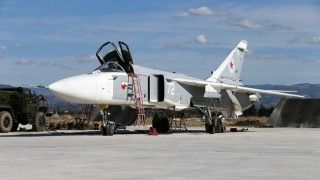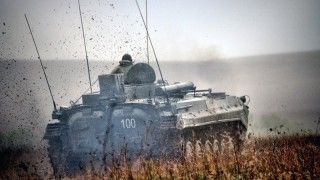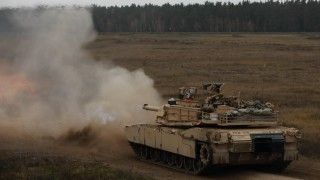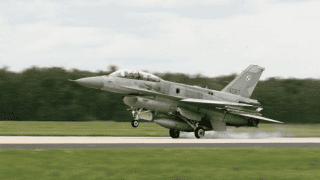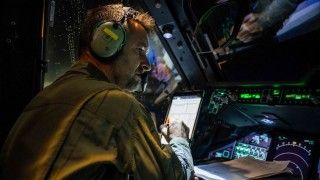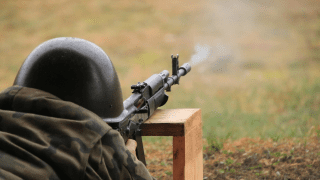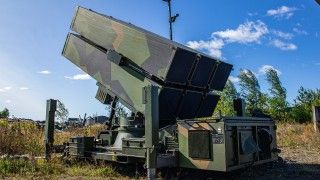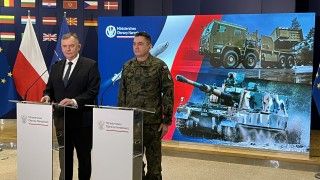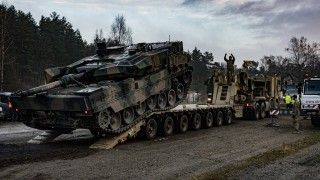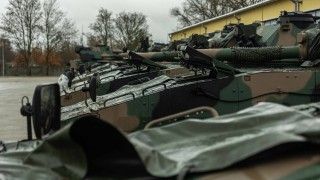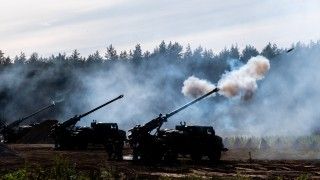- WIADOMOŚCI
East Front News #23: France's Military Shift in Africa, South Korea Secures Arms Deliveries to Poland
East Front News is a weekly newsletter summarizing the past week’s most important events concerning security and the situation in the Central and Eastern Europe region. It includes original opinions and comments, along with key news items significant from a Polish perspective. If you would like to receive this newsletter, please sign up by clicking .
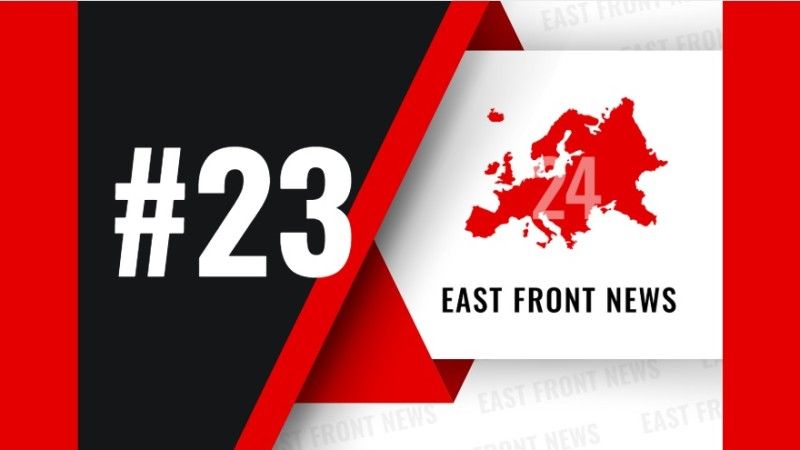
France's Military Shift in Africa
France’s military strategy in Africa is undergoing a significant transition, marked by the reduction of troop numbers and a shift from dominance to training-focused collaboration. This recalibration follows challenges such as coups in Mali, Burkina Faso, and Niger, as well as criticism for its retreat in the face of Russian influence and regional instability. While France maintains key bases in Côte d’Ivoire and Senegal, its influence in Chad and Gabon has waned, with reduced troop presence and terminated defense agreements.
This strategy aims to retain a foothold through smaller, specialized deployments and partnerships with local militaries, focusing on security collaboration rather than control. From the Polish perspective, when in 2008, then in 2013, and later in 2016, Poland refrained from joining French military missions (unlike Estonia and Czechia), the consequences of terrorism and migration from Africa are now acutely felt, particularly on the Eastern border with Belarus. This highlights the interconnectedness of global security and regional challenges.
South Korea Secures Arms Deliveries to Poland
Following the imposition of martial law in South Korea and an almost-coup scenario, no disruptions are expected in military equipment deliveries to Poland. This stability ensures the continuation of seamless cooperation between the two nations, with arms shipments proceeding on schedule. Additionally, a high-level South Korean delegation is set to visit Poland next week, reinforcing ties and fostering collaboration. Recent discussions with Minister Seok Jong Gun from the South Korean Ministry of Defence Industry and executives from leading manufacturers such as Hyundai Rotem and Hanwha have confirmed Poland’s priority status in arms delivery agreements, securing timely and efficient execution of contracts.
The Ukrainian footprint in the Syrian civil war
At the end of November this year, there was a renewed escalation in the Syrian civil war. The picture of the situation in Syria after the resumption of hostilities in the civil war is very complicated. One of the reasons for this situation is the number of actors involved in the conflict, e.g. Hajat Tahrir ash-Sham (HTS), the Syrian Democratic Forces, Bashar al-Assad and his supporters, Turkey, the Russian Federation and other non-state actors. Recent reports of Russian units withdrawing appear to be true, and now an interesting clue is the Ukrainian footprint in the Syrian civil war. In June, it was reported that special units of the Ukrainian Military Intelligence Service (HUR) were present and operating in Idlib province against Russian installations in Syria. This is another example of Kyiv’s international rivalry with Moscow, next to the documented rivalry in Sudan and Mali.
The Ukrainian footprint in Idlib province and the possibility that HTS fundamentalist troops had previously trained should suggest some level of Kyiv’s cooperation with Ankara, which instrumentalised the »rebels« and sought to control Idlib as much as possible. Media reports and audiovisual footage suggest that Ukrainian special forces from the Chemik Group had already attacked a Russian outpost on the outskirts of Aleppo on 15 September 2024, and are currently supporting the HTS offensive.
The ceasefire in Ukraine in the perspective of the NATO Secretary General
Nato Secretary General Mark Rutte has suggested that Ukraine should postpone any peace talks with Russia until the Western allies are able to send Kyiv sufficient military aid. Increasing the supply of arms, ammunition and air defence would aim to improve Ukraine’s situation on the battlefield and thus raise its negotiating position. Rutte’s swift response is due in part to the future presidency of Donald Trump, who is calling for peace talks between Ukraine and Russia as soon as possible. The Nato Secretary General stresses not to discuss within the Alliance what a peace process could look like, but to improve Ukraine’s power position. Rutte points out that Trump’s announcement of a 24-hour peace without Western help will benefit Moscow more and leave the spectre of potential future Russian expansion looming over Europe.
See also

Mark Rutte said that it is up to Ukraine to decide when it is ready to start negotiations with Russia in a war that has dragged on for almost three years. Significantly, Kyiv has changed its position in the context of a deal to end the war and has decided that in exchange for NATO membership, Ukraine is prepared to cede some of its territory to the Russian Federation.
Poland Procures Missiles for Its "Current and Future Fighters"
Deputy Minister of Defence Paweł Bejda announced the signing of a contract for the Polish Air Force to acquire AIM-9X Block II air-to-air missiles.
The agreement, signed by the head of the Armament Agency, Brigadier General Artur Kuptel, with the U.S. government, includes the delivery of 232 missiles. The first missiles will be handed over to the Polish Armed Forces between 2028 and 2030. The contract is valued at $175 million. The U.S. State Department approved Poland’s purchase of these missiles in March 2024, with the maximum transaction value notified at $219 million.
French forces practice rapid air deployment to Estonia
As part of the exercise Pikne, approximately 200 soldiers from the French Armed Forces« 3rd Marine Infantry Parachute Regiment arrived at Ämari Air Base today during a rapid deployment drill. The troops, transported by aircraft, relocated to integrate with the NATO multinational battlegroup permanently stationed in Estonia. The joint units are practicing responding to military threats on land, in the air, and at sea.
„It is incredibly important for us to operate beyond France’s borders, to learn from other militaries and their procedures, and to share our expertise with one another. We stand shoulder to shoulder, united in our missioon,” said Colonel Colomban De Poncharra, Commmander of the 3rd Marine Infantry Parachute Regiment.
Will the Polish Army Get a New Steel Helmet? The Ministry of Defence Has a Plan
Steel helmets will be replaced with composite ones, the Polish Ministry of Defence (MOD) confirms. However, since polymer materials lose their properties over time and helmets require replacement, the ministry is also exploring helmets made from new steel alloys.
„We are completely moving away from steel helmets in favor of composite ones, which are safer and better suited to modern battlefields,” Deputy Minister of Defence Cezary Tomczyk said during a session of the parliamentary defense committee. The committee, at the General Staff of the Polish Armed Forces, was reviewing information on the Szpej and Tytan programs. „This year alone, we have fulfilled contracts for the delivery of nearly 80,000 composite helmets. We are focusing on development and modernization, which has resulted in plans to introduce the HBT-02 helmet from the Tytan program,” he added.
German-Nordic Air Defence Over Rzeszów
The Norwegian authorities have announced plans to send approximately 100 soldiers, air defence systems, and F-35 fighter jets to Poland. „We are standing by our commitments within NATO,” said the head of Norway’s Ministry of Defense.
„Ukraine still urgently needs military support, and Poland is the most critical logistics hub,” stated Defence Minister Bjørn Arild Gram. He also emphasized that Norway will take responsibility for the air defense of the „most important transportation hub for civilian and military supplies from other countries to Ukraine.”
Funding For the Polish Artillery Purchases in Korea Secured
Bank Gospodarstwa Krajowego has signed agreements for the financing of the second batch of executive contracts from the Republic of Korea for K9A1/K9PL howitzers and Homar-K multi-launcher rocket launchers with ammunition, Deputy Minister of Defence Paweł Bejda announced.
During a press briefing, Deputy Defence Minister Paweł Bejda announced that Bank Gospodarstwa Krajowego (a Polish national development bank) signed documents on 27 November to finance the purchase of howitzers and rocket launchers from the Republic of Korea through the Armed Forces Support Fund.
Polish Leopard 2PLs Replace Twardy Tanks in Latvia
Polish Operational Command of the Armed Forces has announced that, as part of the rotation of equipment for the Polish Military Contingent in Latvia (PKW Łotwa), Leopard 2PL tanks have replaced the previously used PT-91 Twardy tanks. This change enhances the standardization of the NATO battle group stationed there.
Until now, Poland had deployed a tank company equipped with PT-91 Twardy tanks from the 16th and 18th Mechanized Divisions (specifically the 9th, 15th, and 19th Brigades) as part of PKW Łotwa. These tanks became a symbol of Poland’s presence in Latvia and an opportunity for many tank crews (and others) to train abroad since 2017. Now, however, they have been replaced by more modern Leopard 2PL.
Last Rak Mortars Delivered to the 12th Mechanized Brigade
Deputy Minister of Defence announced that the 12th Mechanized Brigade has received its full inventory of Rak self-propelled mortars.
„Raks assembled! Another contract supervised by the Armament Agency has been successfully fulfilled. The 12th Mechanized Brigade has received the company-level fire module of Rak self-propelled mortars. We are proud that modern Polish-made equipment is reaching our soldiers,” wrote Minister Paweł Bejda on X.
If you would like to receive this newsletter, please sign up by clicking.
East Front News is a weekly newsletter and article on Defence24.com summarizing the past week’s most important events concerning security and the situation in the Central and Eastern Europe region. It includes original opinions and comments, along with key news items significant from a Polish perspective.
Aleksander Olech, PhD & Jakub Palowski, Deputy Ed. in Chief, Michał Górski














